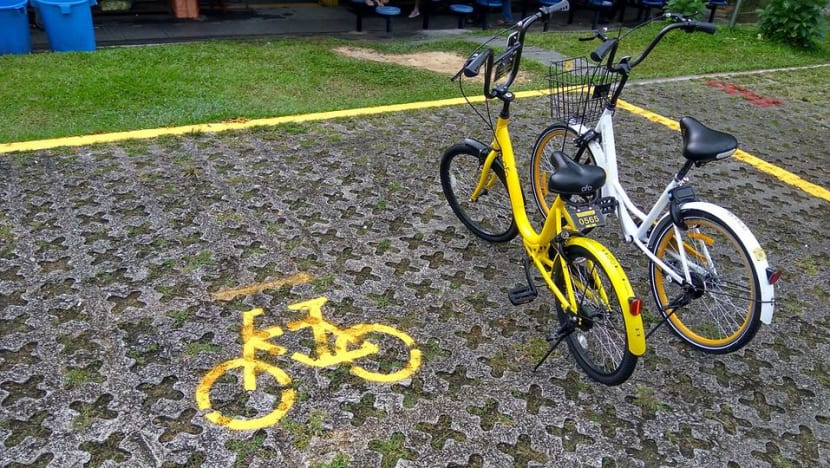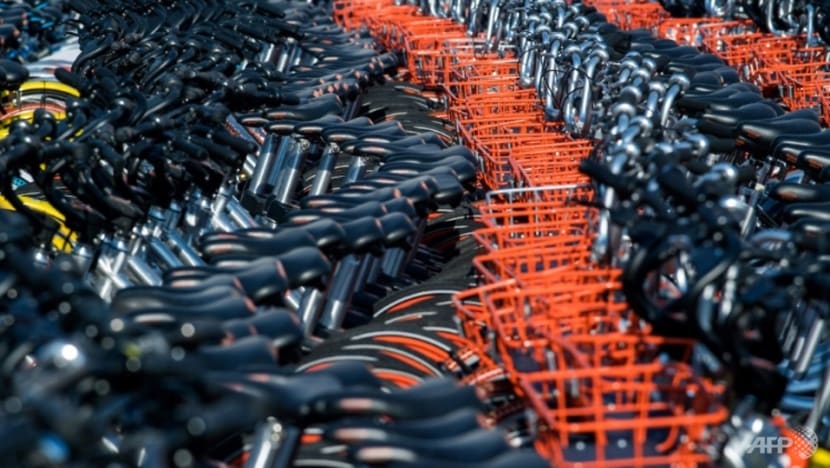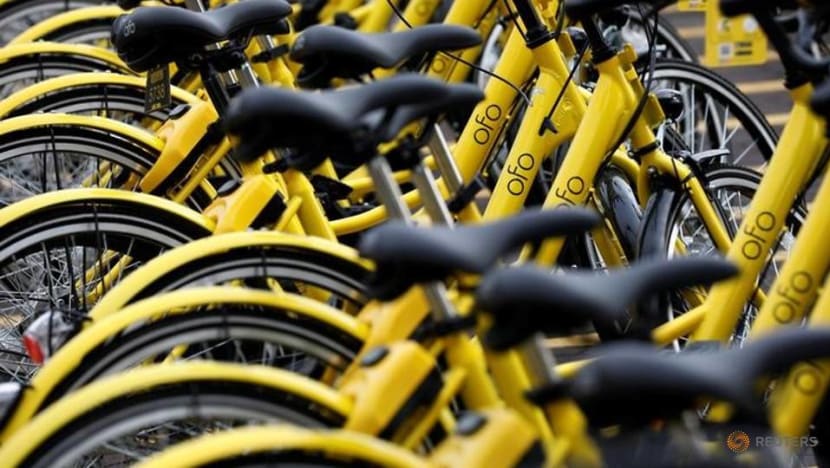Wheel woes: The rise and fall of Singapore's bike-sharing industry
Another one bikes the dust? First oBike then Ofo and now Mobike hit the brakes - a look at the bumpy ride for bike-sharing firms in Singapore.

A bicycle parking zone outside an MRT station. (Photo: LTA)
SINGAPORE: With the deadline for Ofo to remove all its bicycles from public spaces in Singapore by Wednesday (Mar 13), and Mobike wanting to exit the same market, it appears that the heyday for bike-sharing here is over.
According to the Land Transport Authority (LTA), Ofo's failure to do so could result in regulatory action including the cancellation of its licence. Former employees had earlier told Channel NewsAsia that the company had "practically ceased" with no staff left.
READ: Mobike calls it quits, seeks LTA approval to surrender licence
This comes on the heels of another China-based bike-sharing provider Mobike announcing it has applied to LTA to surrender its licence, although the regulator said it is assessing the company's request.
Should both Ofo and Mobike lose their licence to operate here, this would leave Singapore startup SG Bike as the only other entity with a full operating licence. Other players such as Anywheel and Qiqi Zhixiang only have a sandbox licence to offer such services here.
The industry's decline is in sharp contrast to its promising start, with Ofo and oBike initially raising millions of dollars from investors and expanding quickly to other market.
However, issues such as indiscriminate parking by users and abuse of the bicycles put the brakes on these companies' growth. The abrupt exit by oBike last June, which left many users in Singapore scrambling for their deposits to this day, tarnished the beleaguered industry further.

This is a timeline of the industry's key developments in Singapore:
Jan – Mar 2017: Ofo, oBike and Mobike launch in Singapore, introducing a few thousand bicycles onto the roads.
Mar 28, 2017: LTA creates new parking zones, with about 750 additional parking spaces marked out in yellow lines. In a statement, LTA said it was working with bicycle-sharing companies to “incentivise their users to park responsibly”.
Oct 2017: Five bicycle-sharing companies sign a memorandum of understanding (MOU) with LTA, the National Parks Board and town councils. Under the MOU, bicycle-sharing companies would have to remove indiscriminately parked bicycles within half a day, implement geo-fencing technologies by the end of 2017 and educate users on the proper uses of their bicycles, among others. In addition, LTA would create more than 4,000 yellow parking boxes.
READ: Bike-sharing operators, authorities move to cut irresponsible use of bicycles
Mar 5, 2018: Parliament passes the Parking Places (Amendment) Bill. Some measures include a new licensing regime for shared bike operators, a review of fleet size every six months, and a QR code-based geo-fencing solution. The geo-fencing solution requires users to scan a QR code at each parking space to ensure proper parking.
Jun 25, 2018: OBike announces its closure in the wake of new regulations implemented by the LTA. The company owed a total of US$4.6 million (S$6.3 million) to its users in deposits, with many users reporting difficulty in retrieving their deposits,
Jun 29, 2018: Mobike and Ofo submit licence applications to the LTA. They become the fourth and fifth companies to apply for a licence, following the footsteps of SG Bike, Anywheel, and oBike.

Oct 29, 2018: LTA awards licences to six bicycle-sharing companies. Ofo, Mobike and SG Bike received full licences, while Anywheel, GrabCycle and Qiqi Zhixiang received sandbox licences. Mobike was given a maximum fleet size of 25,000, while Ofo was given a maximum fleet size of 10,000 at its request.
Nov – Dec 2018: Ofo terminates hundreds of employees in Singapore and faces “immense” cash flow problems. Two vendors in Singapore complain that the company owed them about S$70,000.
Jan 4, 2019: GrabCycle gives up its sandbox licence, choosing instead to focus on a shared electric scooter service.
Jan 14, 2019: LTA’s QR code-based geo-fencing solution comes into effect. Users who fail to scan the QR-code at the end of their trip face an additional S$5 charge on top of their rental fee.
Feb 14, 2019: LTA suspends Ofo’s licence, citing the company’s repeated failures to comply with regulations. Ofo had failed to implement the QR-code system for parking and did not reduce the size of its fleet to the stipulated limit of 10,000.
Mar 12, 2019: Mobike submits application to LTA to surrender its bicycle-sharing licence, but employees were not told beforehand that the company intends to cease operations.
Mar 13, 2019: Deadline for Ofo to remove all its bicycles from public spaces.















